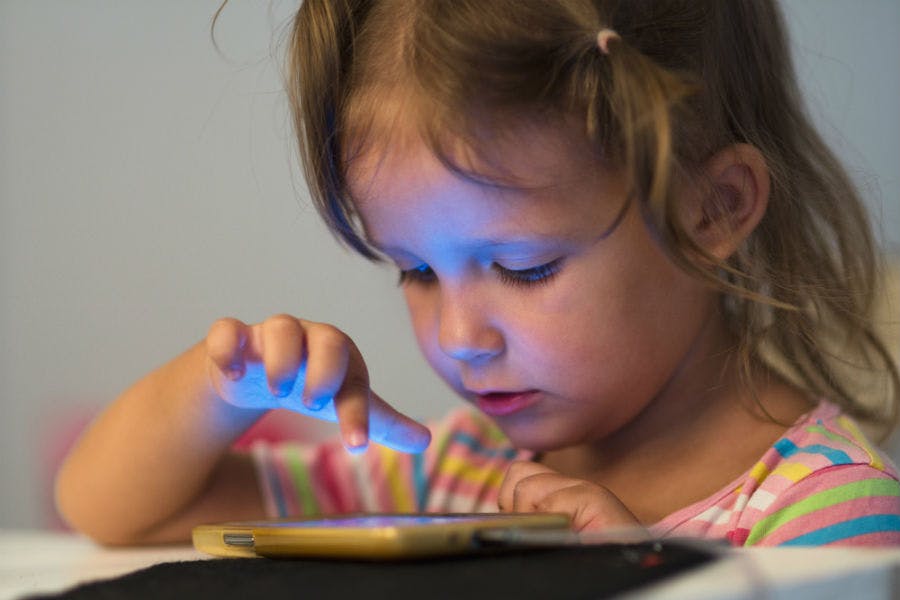If your children were born in the late 80s or 90’s, they grew up with the dawn of the Internet. They were there for the mobile phone explosion. They were the first generation to try “texting.”
But for kids born from 2000 onward, especially those born after 2010, it’s almost a different world. Technology has seriously taken off at exponential rates.
These children have grown up surrounded by the Internet, mobile devices, and instant connections. Today, it’s not unusual to see small children playing on iPads, or hear them using words like ‘password’ or ‘algorithm.’ As adults we recognise all too well that technology is pervasive in our world, but for children, it is ever-present. There has always been an abundance of technology available to them. They’ve grown up never knowing any different.
While it comes as no surprise that children take to technology very readily (screens are fun and addicting and there’s an endless array of entertainment found on the Internet), what is somewhat amazing is how easily they learn to use this technology.
What makes young children so generally tech-savvy? How is it possible that some 3-year olds seem to understand technical concepts their grandparents and parents can’t even fathom? Let’s take a closer look.
The Birth of Digital Natives
Your young child may not yet be able to talk or to walk, but, according to one study, chances are he or she can use a smartphone. Today’s young kids are brought up exposed completely to technology, giving rise to the term “digital natives.” With phones in our hands, it’s no surprise that the babies and children in our arms accept the existence of screens so readily. They are everywhere.
Technology is part of the everyday life of the average child. Kids aged 3-5 tend to spend around 4 hours per day with technology. Other age groups are showing an increase in the amount of time spent as well. This technology may include computers, smartphones, tablets, television, video games, and a range of other gadgets. When technology isn’t being used, it is still prevalent. Kids see others using technology, and older children’s conversations may even revolve around popular YouTube videos or the latest app.
Although technology can mean any number of items, when we speak of technology and kids today, we’re likely thinking mostly of children using the Internet or mobile devices. What do kids do online? The youngest may be using technology most passively, watching videos on a laptop or tablet. But even by 2 or 3, many children are able to interact with apps. In fact, there are even lists of the best apps for kids of that age! Parents surveyed report having downloaded and installed 8 or 9 apps just for their children on their own devices.
Once children hit school age, social media may become their primary interest, as they can use these platforms to interact with friends, and share videos, memes, and other content. Statistics tell us that 45% of 8-11 year olds use social networking sites. Facebook and YouTube are leaders among this age group, but the same study revealed interest in child-specific sites like Moshi Monsters and Club Penguin. Apps like Snapchat quickly become more popular as the kids get a bit older, allowing them to send fun, short videos to others. And it’s likely their friends are on it, too. In the US, 79% of teenagers are on Snapchat. There’s no doubt that a lot of the most popular social media networks have young people in mind, either. Snapchat paved the way with its fun stickers, filters, and voice changers---something which Facebook and Instagram have since picked up as well.

There are many apps built specifically to appeal to young people.
Does your child ever seem to know more about technology than you do? Many parents admit to asking their teenagers for help with problems on their phones or tablets, and even younger children demonstrate remarkable skills with computers. In research by Ofcom, over 50% of children aged 6-15 claimed to use and know a lot about apps on smartphones or tablets. A mere 3% said they’d never heard of apps. That certainly is a different statistic than those of a more advanced age. If you’re having a problem with your device, you might want to consider asking your child for assistance!
Adapting to new technology is notoriously difficult for older adults, but it seems almost inversely as easy for the younger folk. The omnipresence of technology is not the only thing that seems to put kids leaps and bounds ahead of older generations. It also has to do with the way they learn and absorb information.
Early brain development supports “critical periods” in children under the age of 7. During these times, the chemistry of the brain is ideal for learning new skills and taking in fresh information. Technology brings about a relatively newer skill set for young children, but there has been much evidence that kids can do things like learn languages and pick up musical abilities faster than adults. Technology can fall along the same lines.
Young kids have tremendous mind power. Research has shown the incredible capabilities of the infant brain. One example involves visual cues. Researchers created a method to understand how infant children were grasping concepts, since the children were unable to communicate verbally. The approach, visual expectation, uses the children’s gaze direction to determine whether or not they are understanding the patterns of certain visual events. In one instance, a researcher flashes an image twice on the left side of a screen followed by three times on the right side. This pattern is repeated multiple times. The researcher will then observe the infant’s gaze as the flashing images continue being shown. They watch closely to see how the baby’s gaze moves. Following two flashes on the left, some babies were observed shifting their gaze to the right, as if in anticipation of the next (the 3rd) flashing image. This approach revealed that infants as young as 5 months were able to count up to three.
The intuitive nature of modern devices may also be responsible for the instinctive way with which children interact with them. Touch screens, for instance, can be manipulated by tiny fingers with relative ease. It’s natural for children to discover things through touch, so in this way, a tablet or smartphone can be a useful and natural tool in their quest for discovery.
How Much is Too Much for ‘Generation Tech?’
There is much debate about the relationship between children and technology. Some argue that screens are becoming a virtual babysitter. Studies reveal that attitudes of parents may support this notion. Of Australian parents, 50% state that technology has helped to entertain their children during school holidays. Roughly 2 in 5 parents reports ‘appreciating’ that technology can be used to distract children when on a family holiday or when the adults are busy. Certainly, many parents will admit to having soothed a child or diverted their attention with a film or TV show.

Technology is ever=present. Does it need to be limited for young children?
Some question whether or not kids can have an excess of screen time. How much is too much? According to one source, children under the age of 8 are spending just over two hours per day interacting with or looking at screens. About 35% of this screen time is via a mobile device. Two hours may not seem like a huge amount, but for the school-aged child, this could be a large portion of their free time.
Many adults still reminisce fondly of a past when the Internet didn’t exist: an era when neighbourhood children played together and when most activity took place outdoors. It’s not uncommon to hear criticisms of children’s connection with technology today, particularly with regards to video games and other forms of entertainment.
Inevitably, the question arises: are children too dependent on technology today?
A fair number of parents say no. Many parents indicated that going one day without technology would not be much of a burden for their children. Almost 50% of the parents said their kids would miss the technological connections, but would very easily make the adjustment. Some children would not even notice it was lacking at all---26.4% of parents believed this to be the case. Although, it is worth noting that there may be a certain level of technological addiction for kids. When parents have placed limits on children’s screen time or technology use, 58% of those parents said that their offspring reacted emotionally or ‘threw a temper tantrum.’
The Future in the Hands of Our Children
Despite some concerns about ‘too much technology,’ much evidence demonstrates that technology is having---and will continue to have---many positive effects on today’s children.

What does growing up alongside technology mean for the future?
First, it gets them ready for the world of schooling. The 21st century classroom is in the midst of transitioning to a largely digital approach. Most educators are welcoming these changes and working to implement them into their teaching. Kids who have been working with technology from early on may be better equipped to learn in an educational environment that relies heavily on computers and other devices. And in fact, effective use of classroom technology has been shown to engage students in ways that traditional teaching methods cannot.
Second, technology may be making kids truly smarter.
The technology available at a given time in history plays a large role in determining how the human brains of that period develop. Today, the pliable minds of children are actually becoming wired in ways that are strikingly different to previous generations. It’s been observed that with the rise of the Internet, the human brain is becoming more and more programmed to scan information rapidly and efficiently---actually changing in its physical structure.
Finally, adapting to technology at an early age gives young children a (very) early head start in the job market. It’s no surprise that the workforce is going increasingly digital. Across industries, from transportation to agriculture, advanced skills are needed. For our children to truly thrive in the future economy, it may be quite worthwhile to introduce them to technology as soon as possible.
Technology Tips for Parents and Kids
There are certainly ways that technology could have a negative impact on young children. There are some studies suggesting that early exposure to technology can actually slow down certain cognitive abilities or delay various skills. There’s plenty of research on both sides of the spectrum, but the common ground seems to be that technology is good for young children---in the appropriate settings, time frames, and approaches. Here’s a few simple ideas on helping your kids get the most from their ‘screen time,’ even if they’re still babes in arms.
Emphasise ‘active engagement’
There’s not quite the same benefit to staring passively at a screen as there is to interacting with it. Unfortunately, a lot of young kids’ screen time involves watching video. To give your children a more well-rounded connection with their technology, ensure some of their screen time involves them engaging directly with the device. This is especially beneficial if the activity involves some problem solving or some level of creativity.
Find a balance
It’s undeniable that there are many elements needed for physical and mental health and wellbeing. While technology has its place, make sure your children are spending plenty of time exercising, getting outdoors, and doing other mind-growing activities like reading. Time away from technology is advantageous, and contributes to a strong and healthy mind. For older children and teens, parents may need to set specific limits on screen time to help kids find that balance.
Teach children about Internet safety
From the time they begin using the Internet, but especially as they get older, it’s vital to help kids learn about staying safe online. This is important if they will be using social media, creating an email address, or even simply messaging friends. Instruct them on Internet privacy and the dangers of sharing personal information online. Make sure your children know that they should alert you if they ever feel uncomfortable with something they encounter online. Encouraging an open dialogue is the best way to keep tabs on your child’s online activity, and to ensure that they feel able to come to you with concerns.
With a few simple guidelines, your children’s time with technology can be to their best, safest advantage.
What is your opinion on kids and technology? Do your kids seem to learn new technology quickly?